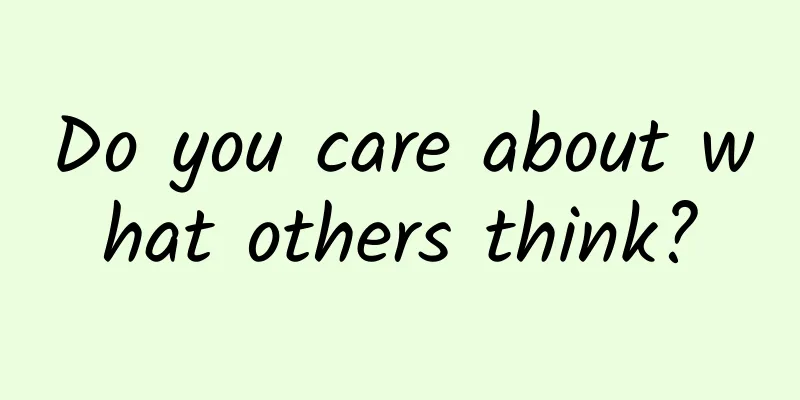Do you care about what others think?

|
© The Good Men Project Leviathan Press: “You will become way less concerned with what other people think of you when you realize how seldom they do.” This quote from David Foster Wallace’s Infinite Jest can remind us at any time that in fact, in the eyes of others, you are not as important as you think. That being said, we humans have a hard time suppressing the urge to be self-righteous, in other words, to take ourselves too seriously. There are many disadvantages to doing this, the most obvious of which is that the egocentric thinking pattern will turn into paranoia, believing that others are thinking about you, talking about you, and watching you - of course, they are not. As a result, you will gradually become the false self in the eyes of others. Today, with the prevalence of social media, its negative effects on young groups are becoming apparent: for adolescent boys and girls (especially girls) who grew up in environments such as Facebook and Instagram, there is a surge in the incidence of emotional disorders such as anxiety and depression due to excessive concern about others' comments on their body/appearance. (jamanetwork.com/journals/jama/fullarticle/2664031) (bmcpsychiatry.biomedcentral.com/articles/10.1186/s12888-021-03235-w) (www.sciencedirect.com/science/article/abs/pii/S1740144519303754?via%3Dihub) (psycnet.apa.org/record/2021-98715-001) A friend once said to me something that I think is just wisdom: “If I wouldn’t invite someone into my house, then I shouldn’t let them into my head either.” But that's easier said than done. Social media has opened the door to the brain, and intruders are everywhere. If you post anything about a celebrity online, it's likely to make its way to the celebrity at home on the sofa, checking their phone. But the key issue is not technology but human nature. We are wired to care about what others think of us. As the Roman Stoic philosopher Marcus Aurelius observed nearly 2,000 years ago, “We love ourselves better than we love others, but we care more about the opinions of others than our own,” whether they are friends, strangers, or enemies. This tendency may be innate, but if we let it run its course, it can lead to a mental breakdown. If we are extremely rational, we will realize that we are worrying too much about what others think and that it is not worth worrying about. However, many people have been carrying this bad habit for as long as they can remember, so we need to take it seriously in order to change this way of thinking. It’s understandable and, to some extent, reasonable to care about what other people think. Philosopher Richard Foley writes in his book Intellectual Trust in Oneself and Others that you trust your own ideas, which are infiltrated and shaped by people who are like you, so whether you want to or not, you trust their opinions. So when a colleague says, “Squidward is great,” you’re likely to think better about the show—at least a little better. (catdir.loc.gov/catdir/samples/cam031/00065171.pdf) Our views of ourselves are more influenced by others than our views of the world. Evolution has a clear reason why: for almost all of human history, people have survived by relying on close-knit clans or tribes. Before humans created modern social structures or facilities such as police and supermarkets, being abandoned by the group meant dying from cold, hunger or predators. This explains why our sense of happiness includes the approval of others, and why the human brain has evolved this response: experiencing physical pain and being rejected by others activate the same neural networks. (sanlab.psych.ucla.edu/wp-content/uploads/sites/31/2015/05/39-Decety-39.pdf) Unfortunately, the instinct for approval doesn’t lend itself well to modern life. Where once humans felt the inevitable fear of being exiled to the snow, today you may feel the same anxiety when a stranger unfollows you because of an ill-considered comment, or when a passerby snaps a photo of your poorly matched outfit and posts it publicly on Instagram to mock you. © Choate Rosemary Hall In the worst cases, anxiety about what others think of you can develop into a consuming fear, a clinical condition called allodoxaphobia. While it’s not yet a mental illness, worrying about what others think of you can impair your ability to do everyday tasks, such as making decisions. When you think about what to do in a particular situation—like speaking in public—a part of your brain called the behavioral inhibition system (BIS) activates, helping you assess the situation and decide how to act (especially considering the consequences of inappropriate behavior). When you have full situational awareness, the BIS is deactivated and the reward-focused behavioral activation system (BAS) kicks in. But a 2013 study showed that focusing on what others think of you keeps the BIS active and weakens executive function. If you're constantly thinking about what you should have said but didn't, this may be a sign that you're being overly influenced by what others think of you. (pubmed.ncbi.nlm.nih.gov/16643947/) (psycnet.apa.org/record/2012-22091-018) One reason we worry about what others think of us is that negative comments can lead to feelings of shame—the feeling of being seen as worthless, incompetent, dishonorable, or immoral by others, so if we care deeply about what others think of us, we’ll have those feelings. Fear of shame makes sense, since research clearly shows that shame is both a symptom and a trigger of depression and anxiety. People go to great lengths to avoid shame, so virtue signaling on social media and giving money to strangers make sense. (www.scientificamerican.com/article/the-scientific-underpinnings-and-impacts-of-shame/) Our tendency to care about what others think of us is natural, but it is not inevitable. Personal flourishing does not require total disregard for the opinions of others, which is both unnatural and dangerous, leading to hubris syndrome and even a diagnosis of antisocial personality disorder. But many of us would be better off if we could learn to “lighten our load.” I suggest the following three steps. 1. Remind yourself that no one cares The irony is that we feel bad because we worry about what others might think of us, but in reality, others think of us much less—positively or negatively—than we think. Research shows that we tend to overestimate how much others care about us and our failures, leading to excessive inhibition and a lower quality of life. Maybe a neighbor or an online fan would have had a negative impression of you if they were paying attention to you at the time—but they might not be paying attention to you at all. The next time you feel uncomfortable with other people's attention, remind yourself that it's only you who cares. You can imagine that everyone around you is in the same situation as you. (psycnet.apa.org/doiLanding?doi=10.1037%2F0022-3514.81.1.44) © Dao Insights 2. Fight shame Because fear of shame often triggers an excessive concern about what others think of us, we should face shame head on. Sometimes a little shame is healthy and reasonable, such as when you say something out of anger or impatience. But more often, this feeling is ridiculous, for example, when you are ashamed of yourself for forgetting to zip up your pants. A few years ago, I was almost at the end of my first 90-minute graduate class of the year when I realized that my trousers were unzipped. There was no way no one had noticed. Afterward, I realized something strange: I felt free—not free to recreate the situation, of course, but free to stop worrying about having a terribly embarrassing accident in class. After the zipper incident, I couldn't think of a worse accident, so I relaxed and had a great semester. I'm not suggesting you walk around with your zipper undone on purpose, but you can ask yourself: What am I hiding that's mildly embarrassing about me? Try not to hide from it and "kill" the useless shame that's holding you back. 3. Stop judging others Jesus taught, “Judge not, and be not judged.” Buddha said, “Anyone who judges others digs a hole for himself.” You may think that you will only face God’s punishment or karma for being harsh on others after you die, but these sayings are important in this world, too. To judge others is to acknowledge that you have the right to judge another person, and it is also to allow others to judge you. The way to break free from this kind of thinking is to stop judging others, and when you do happen to do so, remind yourself that you could be wrong, too. Try this little experiment: Make one day next week a judgment-free day, a day when you don't judge, but only observe. Instead of saying, "It's raining terribly," say, "It's raining." Instead of saying, "The guy who hit my car was an idiot," say, "That person must have been in a hurry." This shift is difficult, but strangely invigorating. You'll let go of the burden of constant judgment, and therefore be less worried about being judged. Lao Tzu once said in the Tao Te Ching: "If you are rich and powerful, you will be proud and bring yourself trouble." (Translator's note: The original text here is "Care about people's approval/and you will be their prisoner", which means "Care about people's approval/and you will be their prisoner", which has nothing to do with the original meaning of the sentence in the Tao Te Ching. This involves a classic translation error. In the English version of the Tao Te Ching translated by foreigners, the meaning of this sentence was misunderstood and then widely circulated.) Lao Tzu was undoubtedly trying to warn the world. But as I get older, I tend to interpret it more as hope and opportunity. I realized that the prison of other people's opinions was actually built, maintained, and guarded by me. So I made a statement that echoes the quote above: Let go of other people's ideas and the prison door will fall wide open. If you are imprisoned in the prison of shame and judgment, remember that the key to freedom is in your own hands. By Arthur C. Brooks Translated by Yord Proofreading/Amanda Original article/www.theatlantic.com/family/archive/2021/11/how-stop-caring-what-other-people-think-you/620670/ This article is based on the Creative Commons License (BY-NC) and is published by Yord on Leviathan The article only reflects the author's views and does not necessarily represent the position of Leviathan |
<<: It is one of the most dangerous birds in the world, but it has been kept in captivity.
Recommend
How to calculate the delayed retirement age? Could we catch up with the delayed retirement in 1974?
The "14th Five-Year Plan for the Development...
The second hero who knocked on the door of space should not be forgotten
On August 6, 1961, Yuri Gagarin was awakened from...
People's Daily on mobile payment: Habits such as casually scanning discount QR codes should be changed
Three bad habits that consumers are prone to: Not...
The goldfish has been wronged for so long, will it really eat to death?
Goldfish don’t die from being “overfed”, they die...
Romantic fireflies are actually very cruel
The silver candle lights up the cold painting scr...
The skinny old man is a big hit! Young people today give up takeout and fall in love with "white people's food"...
Recently, the whole network has been learning to ...
How to master festival brand marketing?
Taking Master Kong’s Father’s Day marketing campa...
Use Intent to open third-party applications and verify availability
This article mainly records: Three ways to use In...
Traditional home appliances are no longer "traditional" and the air-conditioning industry welcomes a new thinking of "network customization"
The Internet wave has swept in, bringing populari...
6 excellent copywriting strategies to teach you how to write sharp copy!
"One good copy is worth 100 sales experts.&q...
Apple iOS 9 may integrate smart home applications
Beijing time, May 21 morning news, American techn...
Planning introduction: numerical design starts from these three aspects
[[150172]] Numerical design is actually born for ...
How to discover user growth points through growth experiments?
Now that the traffic dividend has disappeared, re...
After reviewing Google’s “Guess the Painting” app, I found 5 reasons why it became so popular!
Traffic acquisition of mini programs has been the...









